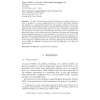Free Online Productivity Tools
i2Speak
i2Symbol
i2OCR
iTex2Img
iWeb2Print
iWeb2Shot
i2Type
iPdf2Split
iPdf2Merge
i2Bopomofo
i2Arabic
i2Style
i2Image
i2PDF
iLatex2Rtf
Sci2ools
134
click to vote
JAR
2006
2006
Some Computational Aspects of distance-sat
In many AI fields, the problem of finding out a solution which is as close as possible to a given configuration has to be faced. This paper addresses this problem in a propositional framework. The decision problem distance-sat which consists in determining whether a propositional formula admits a model that disagrees with a given partial interpretation on at most d variables, is introduced. The complexity of distance-sat and of several restrictions of it are identified. Two algorithms based on the well-known Davis/Logemann/Loveland search procedure for the satisfiability problem sat are presented so as to solve distance-sat for CNF formulas. Their computational behaviours are compared with the ones offered by sat solvers on sat encodings of distance-sat instances. The empirical evaluation allows for drawing firm conclusions about the respective performances of the algorithms, and to relate the difficulty of distance-sat with the difficulty of sat from the practical side.
Related Content
| Added | 13 Dec 2010 |
| Updated | 13 Dec 2010 |
| Type | Journal |
| Year | 2006 |
| Where | JAR |
| Authors | Olivier Bailleux, Pierre Marquis |
Comments (0)

